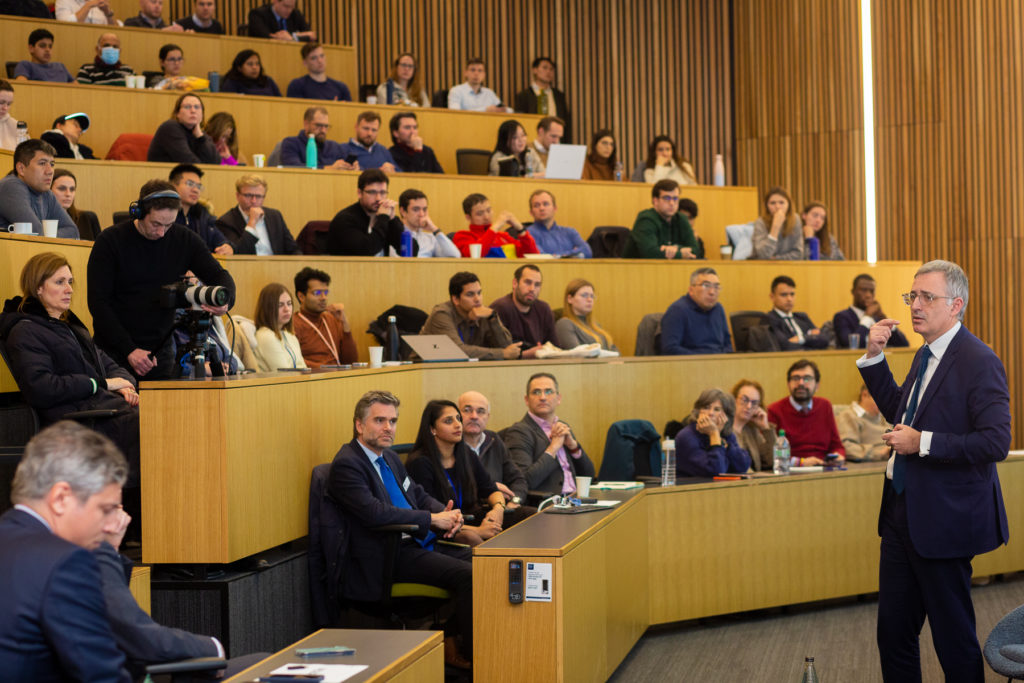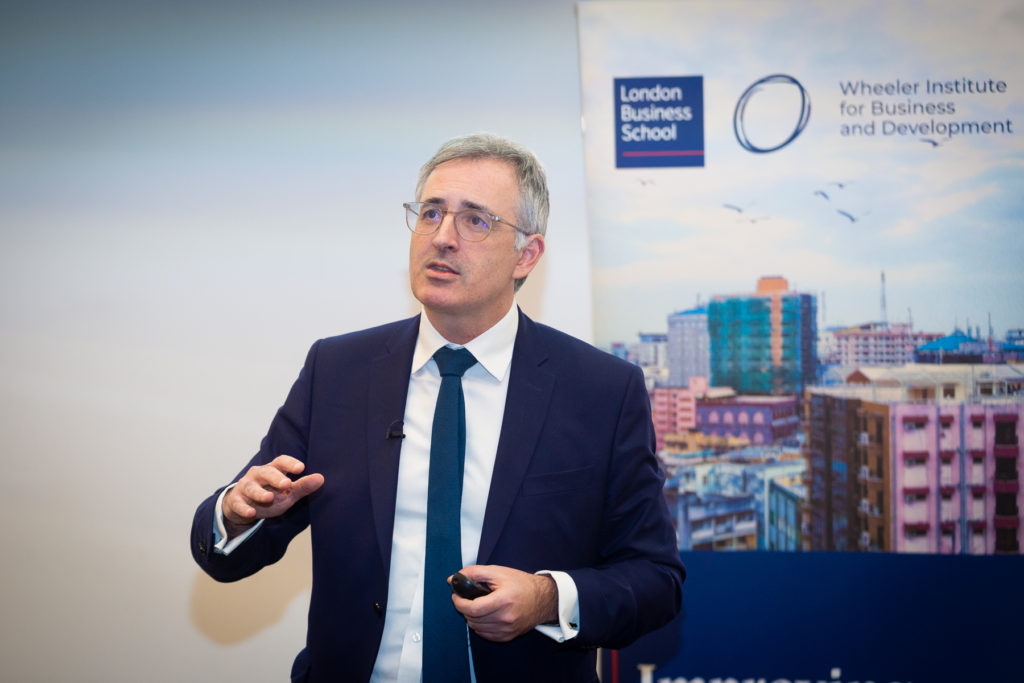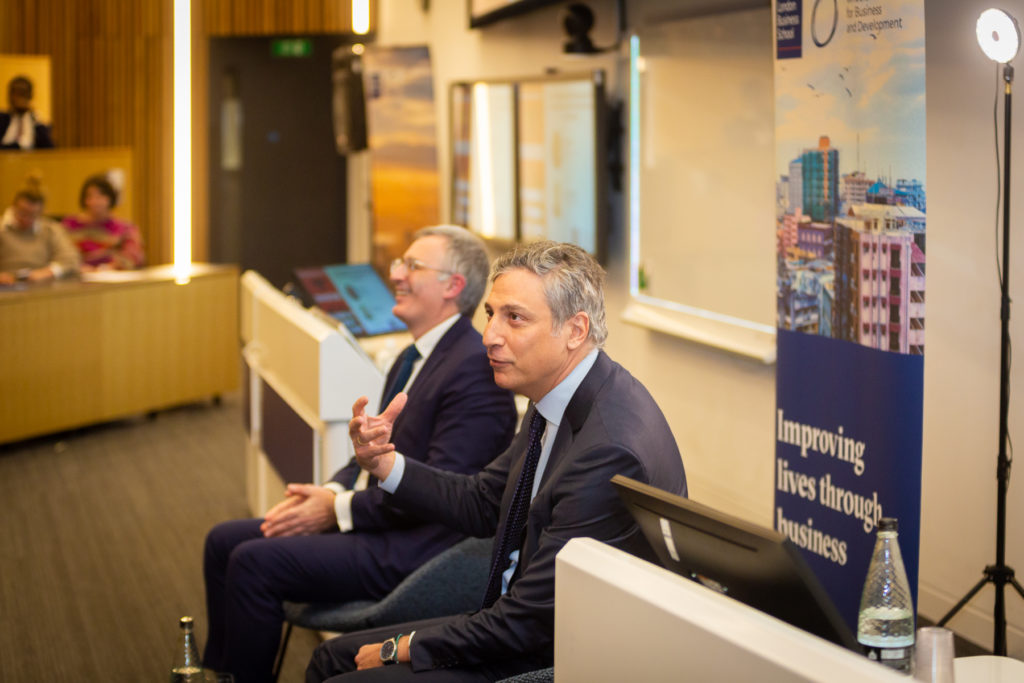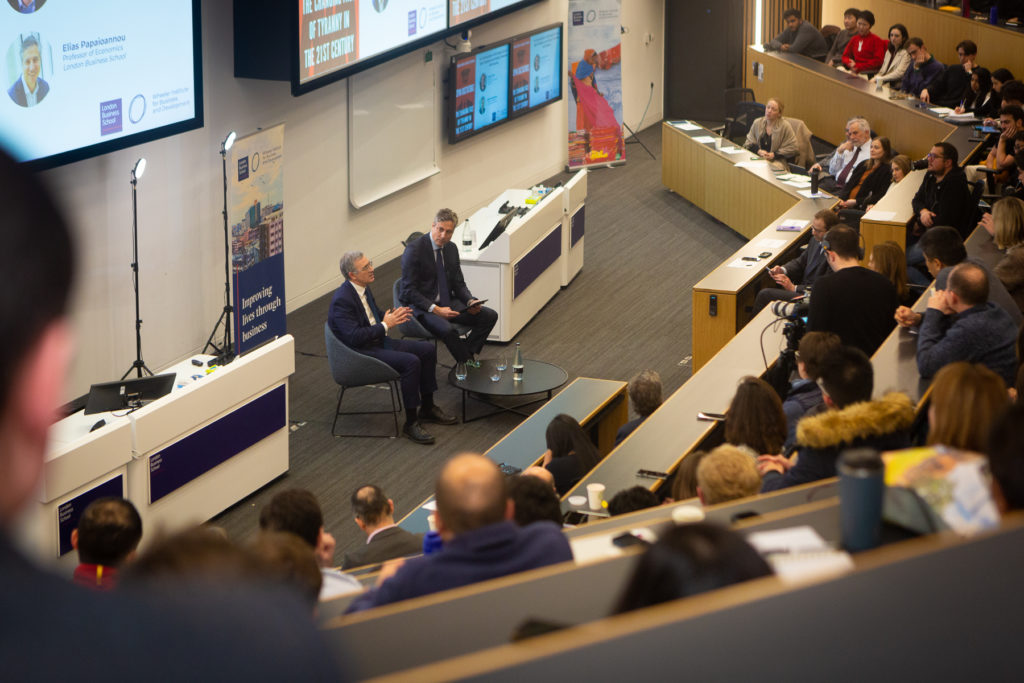Sergei Guriev, Provost and Professor of Economics, Sciences Po, recently joined Elias Papaioannou, Professor of Economics at London Business School and Co-Academic Director of the Wheeler Institute for Business and Development, to discuss his latest book ‘Spin Dictators: The Changing Face of Tyranny in the 21st Century’ and the conflict in Ukraine, the political environment and economy in Russia, and the wider impact of the conflict around the world.
The event began with opening remarks by Dr François Ortalo-Magné, Dean, London Business School. In his speech, Dr Ortalo-Magné briefed the audience on the mandate of the Wheeler Institute – to identify big challenges in the world and apply business frameworks to solve them – and thanked Tony and Maureen Wheeler for their continued support to LBS. He also talked about the Wheeler Institute’s various initiatives, including events such as this one, and invited Professor Papaioannou and Professor Guriev to the stage.
Subsequently, Professor Elias Papaioannou welcomed the audience and introduced them to Professor Guriev. He talked about Professor Guriev’s extensive work in combining academic rigour with applied empirical research and conceptualizing those empirical observations with sound theory. He also mentioned Professor Guriev’s work with the European Bank for Reconstruction and Development (EBRD) in Eastern Europe as well as in his native country of Russia. He thanked Professor Guriev for his presence and invited him to take the floor.
Presentation on ‘Spin Dictators: The Changing Face of Tyranny in the 21st Century’
Professor Guriev is one of the first academics to have studied and observed the differences between contemporary authoritarian regimes and traditional dictatorships. His latest book ‘Spin Dictators: The Changing Face of Tyranny in the 21st Century’, co-authored with Daniel Treisman, is based on rigorous academic research, and suggests that the main difference between old-style and modern dictators is that the latter pretend to be democratic in nature while their ultimate goal is still to concentrate power by eliminating political competition, controlling the media, manipulating information, and projecting an image of competent leadership but without open repression. The book discusses the toolkit of these modern ‘spin’ dictators, dives deeper into their stories, and shows how they learn from each other. The authors also discuss why this model has emerged and what can be done about it.
From fear to spin
In his book, Dr Guriev talks about how traditional dictatorships thrived by creating an atmosphere of fear – induced by imprisoning, torturing, and murdering political rivals and critics. Hence, the name ‘fear dictatorships’. However, that is not to say that fear dictators do not exist anymore. Moreover, in some cases, the reverse transformation (spin to fear) is also possible. The majority of today’s dictatorships are not based on open repression but on manipulation of information. This manipulation is aimed to convey the message that the leader is popular and competent.
Based on an analysis of data on political prisoners, torture, political killings, censorship, and elections around the world in the last several decades, the authors classified regimes into fear and spin dictatorships. The central idea of the book is that these fear dictators have made way for so-called spin dictators. The book discusses the rise of this spin dictatorship model and how such dictators manage to stay in power.
The spin dictator toolkit
According to the authors, the primary tool of spin dictators is deception, as opposed to fear and violence. Sometimes, spin dictators do resort to violence to silence their opponents, but their preference is to always bribe or co-opt them which requires targeted censorship and repression. Spin dictators are also particularly good at concealing evidence of repression. They deny their involvement in putting political opponents in prison or torturing them. While previously some fear dictators were proud of killing their opponents in public, the spin ones prefer to conceal such acts.

Another tactic of spin dictators is that they prefer to put their political opponents in prison on non-political grounds and for shorter terms. Spin dictators make sure that elections are conducted but they manipulate the rules of the elections in less obvious ways. Similarly, spin dictators impose media biases and eliminate opportunities for the opposition candidates to reach out to the public.
The authors also analysed the contents of speeches given by both fear and spin dictators as well as democratic leaders across the world and concluded that the contents of a modern spin dictator’s speeches are the same as those of democratic leaders and significantly different from those of fear dictators. Fear dictators talk about violence, enemies, and fear while democratic leaders and spin dictators talk about the economy, unemployment, inflation, investment, and public goods provision.
Furthermore, spin dictators also censor information about censorship itself. As a result, people living in such societies do not realize how unfree their media is because the information about censorship is also censored. This is a recursive relationship that helps reinforce the notion, which has also been corroborated in recent surveys, that people in such repressed societies believe that their media is more independent than Western media.
Globalization and spin dictators
The idea of the spin dictatorship model is to also benefit from globalization, cross-border investment and trade, and international flows of ideas and technologies. As a result, spin dictators pretend to be democratic to bring in foreign investment, technology, and capital, amongst other things.
As to why this has happened, the authors theorize that as the global economy has become more connected over the last few decades, popularity and support for such dictatorial regimes become easier if spin dictators allow trade with the West and exchange of technology and capital. This idea is not new and was in fact proposed by the American sociologist Seymour Martin Lipset about sixty years ago, who said that modernization would result in the spread of education and growth of the middle class, ultimately leading to democratization.

The authors, on the contrary, propose that modernization does not necessarily lead to democracy. Instead, modernization can transform the old-style fear dictatorship model into the spin model. This new breed of spin dictators is better suited for the modern world which is without borders and much more transparent, which makes it difficult to oppress people without the world noticing. Therefore, the spin dictatorship model is a better fit for today’s realities.
Spin dictators need to engage an educated, middle class to sustain their regime because modern economies grow based on knowledge, innovation, and competition. However, this same stratum of society can be their undoing as well because when there are too many people with tertiary education and critical thinking, they start challenging the status quo. While spin dictators do try to silence those who speak up against the regime by co-opting or selectively censoring them, as the number of such people increases, they eventually start posing a threat to the regime.
As spin dictatorships face this challenge, some of them revert to the old model. And while some authoritarian regimes switch to the fear model, some just democratize.
How should western democracies respond?
The authors recommend that there are several things that Western, democratic societies can do to counter such regimes:
- Monitor better: Spin dictatorships should not be allowed to close their borders. We should engage with the educated class, civil society, and supporters of freedom in those countries because the more people like that are in those countries, the more difficult will it be for spin dictators to sustain their models.
- Reform at home: Western countries should also keep in mind that these regimes are constantly trying to undermine the western democratic system. Authoritarian regimes usually are run on multiple sets of rules, and corruption is a norm rather than an exception. Another norm is the use of corruption money to infiltrate the West and undermine Western democratic institutions. The West needs to be aware of this threat and be prepared to defend itself against such attacks.
- Defend and reform international institutions: International organizations such as the UNHRC and Interpol need to be reformed and purged of those members whose actions are inconsistent with the values of these institutions.
Conclusion
Spin dictatorships have emerged because they are a better fit for today’s world. However, these regimes are facing challenges as they need a critical mass of innovative, educated people to thrive, and these same people are now challenging the spin model. In that sense, there is a ray of hope, as demonstrated by the examples of Ecuador and Armenia.
Spin dictators pretend to be democratic, which is a subtle acknowledgement of the fact that democracy is more popular than open repression. And therein lies the hope that if these regimes pretend to be like us, that means our model is better and they themselves know it.
General discussion on dictatorships and the role of civil society and business
On being asked whether the transformation from a spin to fear dictatorship brings about mass protests from the public or not, Professor Guriev agreed with the hypothesis that it does and gave the example of Armenia. In Armenia, the dictatorial regime maintained a facade of democracy by holding elections. However, when the then President of the country decided to transition the country into a parliamentary republic so that he could become the Prime Minister people understood that he was trying to mislead them. They took to the streets in protest and ultimately the regime fell. Professor Guriev also emphasised the importance of social media in mobilizing these movements.
On what the civil society can do about opposing such regimes, Professor Guriev explained that the role of such people is to inform others, who are not able to see these regimes for what they are, of what is going on. These regimes, naturally, do everything in their power to stop such people from informing and convincing others. Thus, the main battleground for the civil society against such regimes is the information sphere – social media, traditional media, private conversations, amongst other channels – to make sure that dictatorial regimes do not enjoy even the pretence of popularity.

On the implications for business of the rise of these dictatorial regimes, Professor Guriev remarked that when Western businesses engage with people from such regimes, they should expose them to meritocratic practices rather than engage in or co-opt their corrupt behaviour. Not doing so results in those corrupt regimes benefitting from cooperating with Western businesses. Even if the corrupt practices are exposed, dictatorial regimes benefit as it gives them an opportunity to prove to their people that Western democracies are also corrupt. Hence, Professor Guriev recommended that businesses should always maintain very high standards of ethics and integrity when dealing with people from such regimes.
On how democracies can respond to practices imported from spin dictatorships such as spreading of disinformation, Professor Guriev suggested caution and vigilance as there are many instances of democracies turning into spin dictatorships.
On what led to the rise of dictatorship in Russia, Professor Guriev explained that the turbulent epoch of 1990s, when only a minority gained from the market transition, gave rise to a feeling of nostalgia for giving control of the economy back to a strong leader. With Russia being an oil exporter, luck also contributed to the rise in Putin’s popularity as the 2000s were a time of high oil prices, which resulted in superior economic performance as compared to the 1990s. This allowed Vladimir Putin to earn political capital, which he subsequently used to subvert democratic institutions.
On whether democracies are superior to dictatorships or vice-versa, Professor Guriev replied that except for oil-rich monarchies, most developed countries are democracies. He also informed the audience that recent research has established a causal relationship between democratic institutions and economic growth. This is primarily because a democratic decision-making system is more agile and more open to criticism, and therefore better predisposed towards improvements and less vulnerable to grand mistakes.
Discussion on Russia’s invasion of Ukraine
On how effective Western sanctions have been on Russia, Professor Guriev replied that sanctions have limited Putin’s ability to finance the war. Their effectiveness is evidenced by the fact that Russia’s GDP was expected to recover from the pandemic and grow by three to five per cent but ended up contracting by three per cent because of the sanctions. However, it did not fall by 10 or 15 per cent as some economists had predicted mainly because the Russian government has been spending heavily on arms and ammunition to wage its war against Ukraine. It is worth noting though that other metrics of the economy, such as retail trade, declined by almost 10 per cent in 2022. Professor Guriev also remarked that real sanctions against Russia in the form of trade embargo and price cap on Russian oil have only started since December 2022. They will have a severe impact on the Russian economy, as evidenced by the fact that Russia’s trade deficit during December 2022 was roughly 2.5 per cent of annual GDP.
On whether Ukraine is still a democracy and has a chance to survive as a prosperous democracy with corruption scandals coming to light in recent times, Professor Guriev commented that Ukraine is indeed not a liberal democracy in the sense that Western democracies are. There are problems with checks and balances and separation of powers. However, it must be noted that in the last several elections, the opposition candidate won which indicates that healthy democratic institutions are at work in Ukraine. Furthermore, with the roadmap to joining the EU, Professor Guriev believed that Ukraine has a great opportunity to become a liberal, democratic, and prosperous country.

On whether there has been a strategic reset to solve geo-political crises and if so, what would the new strategies look like, Professor Guriev suggested that sanctions are the next-best alternative to all-out war. Citing the example of Iran, Professor Guriev explained that sanctions on Iran were not designed to change the regime in Iran but to change its behaviour and to convince it to sign the nuclear deal. The deal was eventually signed many years later and, in that sense, those sanctions achieved their aim. However, he did concede that a strategic reset would occur once the war in Ukraine ends. What this reset will look like will depend on the outcome of the war.
On whether sanctions have had any effect on public opinion and Putin’s popularity in Russia, Professor Guriev mentioned that the recent war conscription drive in Russia is a direct result of Western sanctions, as they have limited Putin’s ability to sustain a fighting army by paying them handsome salaries. In that sense, sanctions have indeed dampened Putin’s popularity.
On how the war in Ukraine may end, Professor Guriev believed that the outcome of this war will be decided by what happens on the battlefield. One plausible scenario is that Ukraine is able to regain all of its lost territory, in which case Putin will be disliked by extremists as well as those who were opposed to the war in Russia. Another possible outcome is that the frontline is frozen and neither side can progress, like the situation between North and South Korea. In Professor Guriev’s opinion, this outcome will also weaken Putin’s standing in Russia and shorten his time in power. For Ukraine to reconstruct its infrastructure, it would be critical for it to be provided air defence systems from its Western allies. Thus, there may be a possibility that Ukraine starts rebuilding itself while Russia remains under sanctions.
About the participants
Sergei Guriev is a Professor of Economics at Sciences Po. In 2022, Sergei was appointed Provost of Sciences Po. During 2016-19, he was on leave from Sciences Po serving as the Chief Economist of the European Bank for Reconstruction and Development (EBRD). Dr. Guriev’s research interests include political economics, development economics, labor mobility, corporate governance and contract theory. For further details on Sergei’s latest book Spin Dictators: The Changing Face of Tyranny in the 21st Century, please visit here
Elias Papaioannou is a Professor of Economics at LBS, where he also serves as an Academic Co-Director of the Wheeler Institute for Business and Development. His research focuses on international finance, political economy, growth, development, and economic history. Elias has held Visiting Professorships at Harvard and MIT’s Department of Economics
Sagun Tripathi (MBA 2023) worked for more than eight years in the energy sector, across different geographies – the US, Germany, and India – and functions – R&D, consulting, strategy, and operations – before coming to LBS. He is passionate about climate action and how sustainable energy holds the power to transform lives in the developing world.

Ekomobong Peter Iseh